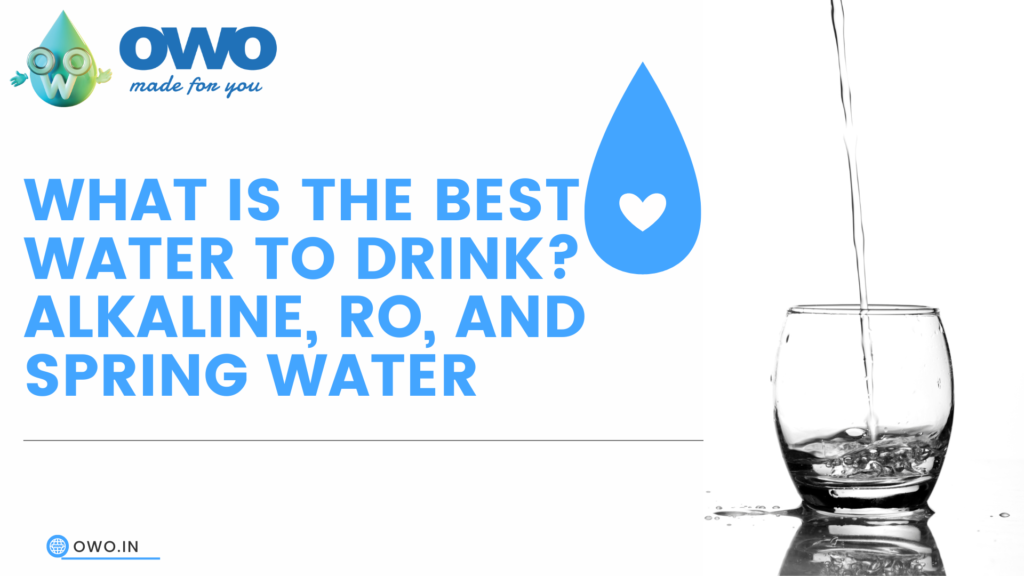Blogs
What Is The Best Water To Drink? Alkaline, RO, And Spring Water Explained
What Is The Best Water To Drink? Alkaline, RO, And Spring Water Explained
The world that we live in today is full of options. Want the perfect AC, car, house, or TV? You have a million versions of everything to choose from. So, it is quite unsurprising for one to find themself stumped by the choices of drinking water. One co-worker believes in the benefits of spring water, and the other cannot live without mineral water. On the one hand, your friend swears by RO water, but on the other hand, a loved one prefers alkaline water. So, what is the best water to drink, and does it even exist?
Well, we are here to help you understand different types of what and what are their advantages and disadvantages.
Different Types Of Water: What’s The Best Water For Drinking?
The vast variety of drinking water that is generally available to us is from private wells, natural springs, or metropolitan water networks. This water goes through a standard process to eliminate dirt, bacteria (or other microorganisms), improve taste, and achieve a balanced pH level. But it could still contain unnecessary amounts of unwanted salt and other materials. So, before making any decisions about the best water, let’s first take a look at the different types of water that you can find.
1. Tap Water
Tap water is the water that comes directly from the faucets at your home. This water is usually sourced from reservoirs, dams, or rivers in the area nearby and brought to your taps by a pipeline system. Generally, tap water is treated in three stages: sedimentation, filtration, and chlorination. Whether this locally regulated water is drinkable or not depends on the quality of water filtration in your area. If your taps only produce hard water, then it may need further filtration to achieve a healthy pH balance.
2. Hard Water
Hard water includes high levels of dissolved minerals like magnesium, calcium, aluminum, and manganese. Typically, if water has 60 milligrams or less of calcium carbonate per liter, it is termed as soft. If the water exceeds 120 milligrams of calcium carbonate per liter, then it is called hard. Due to its high mineral content, hard water may taste foul, cause dry skin or hair and destroy internal plumbing.
You can measure the hardness of water using a TDS meter. You can read all about what TDS means for your drinking water in our dedicated article. In short, TDS is a measure of how many organic and inorganic materials are present in the water. You can test your drinking water for hardness levels using a TDS meter.
3. Mineral Water
For water to be marketed as “mineral water,” it needs to include at least 250 ppm (Parts Per Million) of dissolved minerals. Naturally, mineral water comes from springs that are full of sulfur, manganese, magnesium, and calcium. Some bottled mineral water is artificially produced by adding salts to distilled water to improve its taste.
4. Spring Water Or Raw Water
Unfiltered water that has naturally come to the surface (without needing to be pumped) from a nature-made mineral-dense spring is known as spring water or raw water. This water is unique and rare to find in its natural composition. The main factors that affect this water’s taste and healthiness are the type of soil, climate, and location it’s found in.
5. Purified Water & Different Types Of Water Purifiers
Purified water is tap water that is filtered from impurities like bacteria, fungi, and parasites and made clean and drinkable. A home filtration system is one of the best ways to ensure clean, purified water at all times. The three main types of water purifiers used are RO water purifiers, UF water purifiers, and UV water purifiers. You can read our in-depth water purifier buying guide to know which kind of water purifier you would need.
A. RO Water Purifier (Reverse Osmosis)
An RO water purifier uses reverse osmosis technology and passes pressurized water molecules through a semipermeable membrane to filter them. The RO filter is so fine that it only lets clean water molecules pass through it and leaves behind harmful bacteria, lead, dirt, and other impurities.
The main advantages of an RO filter system are that it is extremely capable of cleaning hard tap water through reverse osmosis, removes any bad taste or odor from your water, and is quite cost-effective. Your RO water purifier price can easily be gained back over time by its long-lasting shelf-life. The main disadvantages of an RO filter system are that it consumes electricity and requires optimum water pressure for reverse osmosis to work effectively.
B. UV Water Purifier (Ultraviolet)
In a UV water purifier, water is passed through ultraviolet rays to remove any harmful bacteria, viruses, or parasites. Ultraviolet rays, when exposed to water, have proven to kill germs effectively. A UV water purifier is ideal for low TDS water like lakes and rivers.
The main advantages of a UV water purifier are that it consumes very little energy and does not remove essential minerals from your water. It is very cost-effective and is worth the water purifier price you pay based on how long it lasts and how little maintenance it requires. The main disadvantages of a UV water purifier are that the dead germ bodies, even though harmless, remain in the water. UV filtration also fails to remove dissolved impurities like pesticides, fluoride, etc.
C. UF Water Purifier (Ultra-Filtration)
A UF water purifier uses a membrane-based technology that does not require electricity to filter water. This water purifier is very similar to the RO water purifier (Reverse Osmosis). The only difference is that an RO filter can block very small particles, whereas a UF filter can only filter out large deposits.
The main advantages of a UF filter are that it works without electricity, does not use chemicals to purify, and easily cleans muddy water. The main disadvantages of a UF filter are that it does not soften hard water, and it may not be completely worth the water purifier price because of how often it needs to be cleaned and maintained for optimal use.
B. UV Water Purifier (Ultraviolet)
In a UV water purifier, water is passed through ultraviolet rays to remove any harmful bacteria, viruses, or parasites. Ultraviolet rays, when exposed to water, have proven to kill germs effectively. A UV water purifier is ideal for low TDS water like lakes and rivers.
The main advantages of a UV water purifier are that it consumes very little energy and does not remove essential minerals from your water. It is very cost-effective and is worth the water purifier price you pay based on how long it lasts and how little maintenance it requires. The main disadvantages of a UV water purifier are that the dead germ bodies, even though harmless, remain in the water. UV filtration also fails to remove dissolved impurities like pesticides, fluoride, etc.
C. UF Water Purifier (Ultra-Filtration)
A UF water purifier uses a membrane-based technology that does not require electricity to filter water. This water purifier is very similar to the RO water purifier (Reverse Osmosis). The only difference is that an RO filter can block very small particles, whereas a UF filter can only filter out large deposits.
The main advantages of a UF filter are that it works without electricity, does not use chemicals to purify, and easily cleans muddy water. The main disadvantages of a UF filter are that it does not soften hard water, and it may not be completely worth the water purifier price because of how often it needs to be cleaned and maintained for optimal use.
5. Alkaline Water
Natural alkaline water is found in sources near volcanoes that are saturated with minerals. Alkaline water has a high pH level that makes the liquid considerably less acidic than other waters out there. Because the water near mineral-dense volcanos is alkaline, it is extremely sought-after for its positive impact on illnesses like blood pressure and acid reflux. However, even with all its health benefits, too much alkalinity can be bad for you.
It is also important to note that many commercial brands say that their water is alkaline, but it is just the tap water that has gone through an electrolysis process to reduce acidity artificially.
6. Distilled Water
Remember distilled water from your high school science experiment? Well, distilled water is the result of boiling water into a vapor that then condenses back into liquid. This process not only supremely purifies but also eliminates any minerals from the water due to its high boiling point. This type of water is extremely clean and sanitary; however, it may lack essential minerals that are nec
7. Sparkling Water
Sparkling or carbonated water is water that is infused with carbon dioxide. Naturally, carbonated water is found in particular mineral springs. Even though sparkling water is harmless, it is suggested that excessive sparkling-water drinkers switch to naturally carbonated water to avoid synthetic additives.
8. Well Water
Well, water is sourced directly from the ground and is commonly found in rural parts of the world. This water is collected deep inside the ground over time from rain and melted snow. A well is normally used in areas that are remote and not well connected to the local water pipelines. Even though natural, like spring water, well water may be polluted and need further filtration to become drinkable.
What Is The Best Water For You?
The most important thing to keep in mind is that any kind of filtered water is better than dirty or hard water. Make sure to find out the quality of water in your area. If your taps are providing hard water, invest in an RO or UV water purifier for clean drinking water every day. If you are struggling with acid reflux or other health issues, incorporate more alkaline water into your life. In conclusion, assess your personal health needs and your environment to find the best drinking water for you. But whatever you choose, you will need to maintain your water purifier always to have safe drinking water.
Onsite offers an Annual Maintenance Contract (AMC) for water purifiers that includes quality consumables, unlimited repairs, and regular preventive maintenance. If you are worried about water purifier problems like bad odor or taste, low water pressure, and other malfunctions, Onsitego’s competent service engineers will be at your door and take care of it all.

